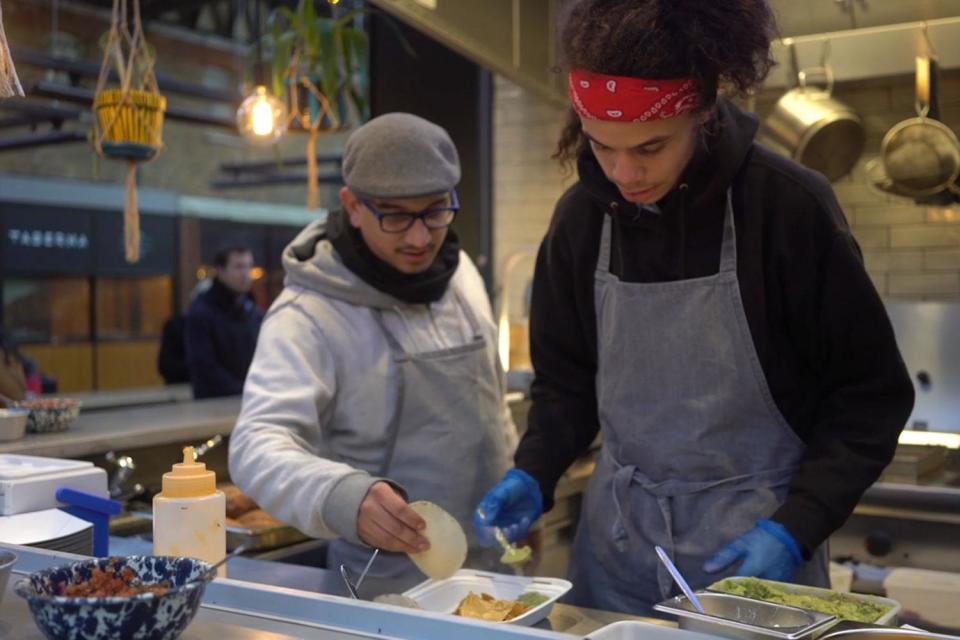Flavours of Change: the London street food charity kickstarting careers for young people
To an outsider, the chicken sub on sale at the Kitchenette Karts street food truck in Spitalfields Market probably looks relatively easy to construct.
Sure, it contains all the necessary elements for a delicious and satisfying lunch on the go: bread with a fluffy middle and crispy edge, tender strips of chicken, and a crunchy thwack from raw vegetables tossed in a chilli and lime sauce. But there’s a lot more to this than meets the taste buds.
The sandwich was made by Keenan Berry, a young street food entrepreneur and recent graduate from the same-named training programme, Kitchenette Karts, founded by Cynthia Shanmugalingam. Aimed at guiding young people towards paid employment in the food industry, it has created a food and business curriculum, as well as organising placements with partner food traders Breddos Tacos, Monty’s Deli, Yum Bun, and restaurants including Ottolenghi Spitalfields, Pizza Pilgrims, Moro and St John.
To date, the team has worked with 29 unemployed young people, 17 of whom found employment after three months and two of whom have set up micro businesses.
In 2017, Berry was living with his mother in Croydon and had finished sixth form studies. He knew he wanted to attend university but hadn’t thought beyond that. He had begun earning money doing shifts at his local bar and post office, but otherwise he was “mostly just playing Playstation all day,” he explains during a Kitchenette Karts shift break. When both jobs fell through because of new rota patterns, Berry hit the internet.
“I found some random post on Gumtree showing that The Prince’s Trust was doing a week-long course for food safety. It was free, and I thought it wouldn’t hurt to learn how to cook,” he remembers.
As a young boy, Berry had cooked with his mum. “It was very basic though - things like chopping cucumbers or stirring the pot,” he laughs. Doing the food safety qualification led him to another event where he met Kitchenette Karts director, Jake Slater, and he now believes that gaining the qualification was one of the best decisions he ever made. “So many doors have opened as a result of it," he says. "I can now go into kitchens saying I’m qualified as a trainee chef.”
“We see this as a passport into the food industry if [the trainees] want it,” believes Slater, whose concept developed out of a successful but separate food business incubator project from 2012, called Kitchenette. A few years later the team felt it could help more directly by empowering people who had no previous links to the food industry.
Skip forward to 2017 when, following crowdfunding, the Kitchenette team launched Kitchenette Karts: a food truck to be used as a vehicle to train young people with help from carefully chosen street food partners, and with the eventual goal of supporting them towards employment.

Today, potential trainees referred from organisations such as The Prince’s Trust can attend a taster session, then an additional three-day bootcamp involving street food business development, storytelling, and studying for a Level 2 food safety and hygiene certificate. A further 12-week programme includes street food work placements, up to three day-long kitchen stages, and an additional part focusing on skills such as clear communication, time-keeping, and CV writing. In March there will be a new programme offering work placement on their own truck in Spitalfields Market.
“A lot goes into our menu planning," says Slater. "The dishes have to be something that trainees can do, and are easily constructible within a street food environment. Initially they might be chopping herbs or slicing bread or garnishing. Over time they’ll start using cooking equipment - we build up their skills as we go."
Slater passionately believes that by gaining exposure to “actual work in a real world kitchen environment", a trainee can get the most useful insight into the skills required for each job, whether that’s logistical planning (getting equipment from A to B, rota-ing staff, and knowing when and how to prep all the food), cooking, front of house, handling money or being aware of allergens. What excites him about street food is that by being in a small team of people “trainees will be playing so many different roles… they can learn and improve fast.”
For Berry, the hard work has paid off and he is on the cusp of launching Smallies in Brighton, which he describes as "British-Trinidadian because it's Trinidadian food with British street food stylings." Named after one of his favourite dishes, small Trinidadian flatbreads known as doubles, which are commonly served in pairs and filled with chickpea curry.
"The doubles are quite small," he explains. "[But also] When people say Smallies it makes people smile which is always good.
"In Trinidad, there are doubles food stands after doubles food stands and it’s definitely something I want to bring here. The food is nice and simple and it has good vibes.”
Slater is sad to be losing Berry from London, but is also really happy for him. "Keenan is one of the best examples of what we’re trying to do.”
Follow Keenan on Instagram
wearekitchenette.com/

 Yahoo News
Yahoo News 
